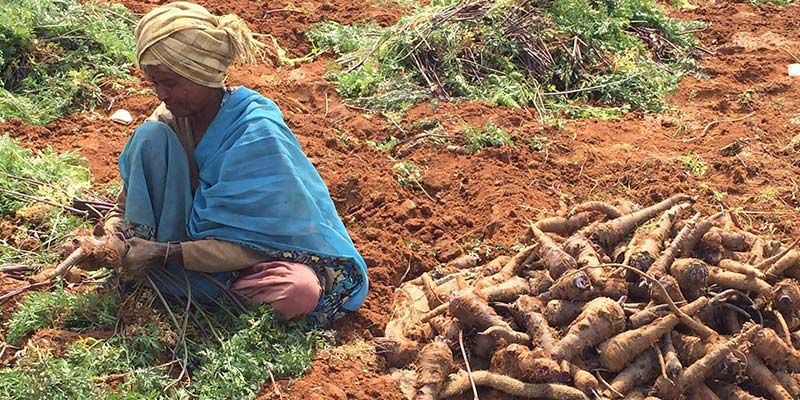From seed to shelf, how Lawrencedale Agro (LEAF) is doing it all
Palat Vijayaraghavan, a long-time resident of Ooty, was witness to the numerous problems farmers were facing every day -- right from seed selection to harvest to getting the produce to the market. Farmers take their produce to the wholesale market where they are at the mercy of a broker who decides both the quantity and the price of the produce that he will buy from them.
Farmers with small landholdings dominate the Indian agriculture scenario with as much as 85 percent of the farmers owning less than five acres of land. They get no support from government agencies or private players for improving productivity. Support in terms of better farming techniques, high-yield seeds, access to water, and post-harvest produce management systems are severely lacking.

Palat Vijayaraghavan founded Lawrencedale Agro with a view to addressing some of these issues. Palat wanted to empower the small landhold farmers through the various phases of farming. This would also serve another issue -- avert forced migration to cities in search of livelihood.
Lawrencedale Agro is backed by Aspada Investment, an impact investment fund, which has significant backing from George Soros' Economic Development Fund.
Services
Lawrencedale Agro is redefining the fresh produce agriculture value chain and has evolved an integrated approach. This includes looking into farming practices. They provide a host of services to the farmers - genetically superior planting materials, technical support to reduce post-harvest loss, cold storage facilities, state-of-the-art facilities for processing the produce, and packaging and transporting the produce to the end user.

Sensing the fast changing dynamics of retailing in India, and the proclivity of consumers to buy branded products, Lawrencedale Agro started branding clean, graded and packaged vegetables under the brand name LEAF in mid-2012. They are involved in the process every step of the way - beginning at the farm. Harvested produce is immediately put in cold storage to preserve their nutritional value and extend their life. The vegetables are then packed in laser perforated food grade packing materials that retain freshness and nutrition. Finally, the produce is shipped to retailers in refrigerated vans with their shelf life printed on the packets.
"Our processing unit strives to ensure zero-residue across products by adopting latest innovations in ozone washing. The fresh produce (vegetables) is safe for consumption, -and our method is dependable. The produce comes in nutrition locking packaging which is increasingly becoming the obvious choice for consumers, who never compromise on such things," says Lawrencedale Agro Chief Financial Officer and Co-founder, R. Balakrishnan.
The impact

The company leverages on extensive community farming initiatives in Southern India. They procure directly from a network of over 3,000 farms. "Winning the trust of the farmers is the key to our strategy of bringing our post-harvest handling expertise to neighbourhood retail stores. Our relationship with the farmers and their welfare are important factors in our expansion plans," Palat Vijayaraghavan adds.
They have come a long way since they started operations in 2009.They have steadily expanded into other regions across India - Tamil Nadu, Karnataka, Andhra Pradesh, Telangana, Kerala, Maharashtra, Punjab, Haryana, and Himachal Pradesh. They are planning to scale their operations and plan to bring 5,000 farmers within their fold by this year – up from the present 3,000. On an average they process 20 tonnes of vegetables every day, and they intend to scale this to 50 tonnes during this fiscal. They have put up a plant that has a capacity to process 100 tonnes on a daily basis - a number that they expect to hit in about three years.
Speaking on their integrated approach, Palat Vijayaraghavan says,
We manage from seed to shelf. We are bringing about a paradigm shift in the entire agriculture value chain by being specialists in post-harvest management. We do not lock the farmers into a contract that binds them to give their produce only to us. We engage in community farming, and we encourage farmers to decide what is best for them.
In this system of produce management, the retailers are gaining as well. Lawrencedale is completely re-orienting the old retail culture - today, the retailers have complete transparency on the quality and quantity of the produce. It also helps them cut down the wastage to a bare minimum because all the vegetables are shipped in refrigerated trucks, in hygienic crates and nutrition-locking packets.
It has not been a smooth ride and only dogged determination has seen them through. Palat Vijayaraghavan tells us, “The challenges are phenomenal in the entire agriculture supply chain. We have to convince the farmers, and gain their trust that we are not just another broker. On the marketing front we have to convince the retailing majors that we can handle their entire back-end for procuring fresh produce.” Helping farmers adopt newer methods is a slow process, and Lawrencedale is taking one step at a time. The retailers started showing interest only after Lawrencedale Agro showed consistency in both the supply and the quality of the produce.

Revenue model and differentiator
Currently, on an average, they ship 20 tonnes of vegetables, daily. Given the fact that retailers do not have to invest in a supply chain for vegetables, and also profit from a drastic reduction in wastage (the average wastage is 20 per cent from retail shelves), they are being recognised as strategic partners for sourcing. Their main source of revenue is from supplying produce to the large and small retailers. Palat adds, “There are companies in India that attempt what we do, but in silos. They handle logistics, or focus on warehousing, or take up some other aspect of the supply chain. There is no company in India which is as integrated as Lawrencedale Agro - they own the entire supply chain for fresh vegetable produce - right from seed to retailers’ shelves.”
On a parting note, he adds,
The important lesson for us is to recognise the fact that the farmer is the backbone of the agricultural ecosystem in India, and we have to keep his faith alive that farming is indeed beneficial to the entire country. This can only happen when we bring some sort of predictability and dignity to their lives.







![[The Turning Point] What prompted this entrepreneur to start a fintech startup](https://images.yourstory.com/cs/2/79900dd0d91311e8a16045a90309d734/turning-point1-1591347518760.png)
